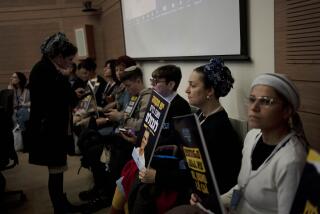Ex-Hostage Angry Over Report, U.S. ‘Paralysis’
Former hostage David Jacobsen reacted angrily Monday to reports that Marine Lt. Col. William Higgins has been hanged in retaliation for Israel’s kidnaping of a Muslem cleric, and charged that the military operation may have scuttled the anticipated release of another American captive in Lebanon.
Jacobsen, who was reunited in November, 1986, with his family in Orange County after 17 months of captivity by the pro-Iranian Islamic Jihad, said “good sources” in London had informed him that hostage Terry A. Anderson was to be released last Saturday as a gesture of good will by the new Iranian government. Anderson, a Middle East correspondent for the Associated Press, was captured in 1984.
Jacobsen, a former hospital administrator from Huntington Beach, also assailed the U.S. State Department for what he termed its “paralysis” since the Iran/Contra scandal in any effort to win release of the eight Americans still being held in Lebanon. President Bush should assign responsibility for all hostage release and rescue efforts to the Justice Department, the FBI, or the CIA, he said.
“These men have been forgotten and not a damn thing has been done for them in two years,” said Jacobsen, 59, in a telephone interview from Colorado, where he now lives. “I’m very angry about that. My friends should be home and they would have been home if they hadn’t had some partisan politics in Washington, D.C.”
Concern for Friend Expressed
A State Department spokesman in Washington declined comment late Monday.
Jacobsen, administrator of the American University Hospital in Beirut when he was kidnaped on May 28, 1985, expressed grave concern for the well-being of his close friend, Joseph J. Cicippio, another American University executive who also has been marked for death by his militant Shiite Muslem captors unless the Muslem cleric kidnaped by the Israelis is released. Jacobsen said he also believes American hostages Frank Herbert Reed, who previously tried to escape, and Edward Tracy, who is reported to be mentally ill, may also be killed.
“I feel great pain for Robin Higgins (the wife of Lt. Col. Higgins) and their daughter, Chrissy, and pain for the families of the other hostages who live in fear,” he said.
Jacobsen also charged that “Israel is guilty of very bad timing” in the commando kidnaping of Sheik Abdul Karim Obeid and two other Shiite Muslems in southern Lebanon last week. But he added that the U.S. should consider military retaliation if any other hostages are harmed.
“We’ve got to play hardball; we have to carry a big stick, and we have to be selective and not harm innocent Lebanese citizens,” he said. “We should warn Iran that if there is another act of violence against any hostage, they have 24 hours before we torch El Kharj Island, their main oil-exporting center.”
Rewards for information leading to the arrest of those responsible for the kidnapings, such as the bounty that resulted in the arrest and conviction of two men involved in the hijacking of the Achille Lauro cruise ship and the murder of an American passenger, also should be offered to gather information about the hostage-takers, he said.
Media Given Some Blame
“Lebanon is a poor country and people certainly would come forward with information,” Jacobsen said. “Why in our Lord’s name does the State Department refuse to authorize rewards for our hostages in Lebanon?”
Jacobsen, who has delivered hundreds of speeches and given countless interviews about his ordeal and concerns for the remaining hostages, said the American media also shares the blame for the “devaluation” of the captives in Lebanon. Even though several of the captives were seized before the U.S. State Department advised all Americans to leave the country in January, 1987, he said, many U.S. citizens assume that the hostages acted recklessly and brought their predicament on themselves.
“The media can do something they haven’t done: create a public awareness of the hostages,” he suggested. “Nobody knows who the hell Joe Cicippio is. Nobody knows who Tom Sutherland (dean of agriculture at American University when he was taken hostage in Beirut) is.
“Poor Tom,” Jacobsen said. “He’s a good friend of mine who’s been held for four years.”
MAIN STORY: Part I, Page 1
More to Read
Sign up for Essential California
The most important California stories and recommendations in your inbox every morning.
You may occasionally receive promotional content from the Los Angeles Times.









